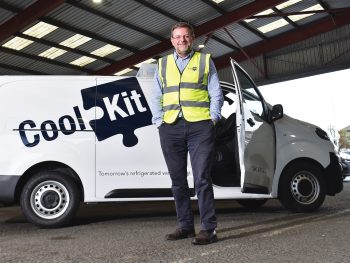What’s the worst that can happen to a small, successful supplier to the fleet sector? It’s a question that most of us would prefer to avoid, but one that CoolKit CEO, Rupert Gatty, found himself needing to answer last July. By John Kendall.

CoolKit has recently celebrated its 18th birthday. That would be cause for celebration for any 18-year-old, but for the company, it was marked in a way that won’t be forgotten in a hurry.
Before reliving that event, here’s some context. The company began with four people back in 2005. Founder Rupert Gatty had a straightforward business plan back then. “As the name suggests, it was my plan just to sell vehicle insulating kits to other third parties to fit them together, but as it turned out, most people said, ‘Look, just build it for us, will you?’ So that is what CoolKit did, designing and making its insulating kits itself.”
As CoolKit became established, business with larger fleet funders followed and Coolkit now works with most of the major vehicle leasing companies. Temperature- controlled conversions are not the only products that the company makes. “A growing part of our product mix is for free- standing, rigid box bodywork of the insulated type,” says Gatty. “They are in food service, particularly in the wholesaling of fruit and vegetables and they get a hard life but are still in one piece. I’m delighted that we seem to have established the right mix of materials and methods that have produced something that is incredibly light but also with industry-leading longevity.”
The company also imports and distributes a range of Italian-built portable commercial refrigerators, which can form part of its conversions. They have proved popular with businesses involved in healthcare distribution and others in food and water sampling, where separation may be required or there is a need for ambient and chilled compartments.
As the company expanded, it established itself on two adjacent sites at Burnley in Lancashire. Then, on 6 July 2023, disaster struck.
It was a Friday at about 3.30pm when Gatty received a call alerting him to a fire. “I was in our adjacent unit at the time,” he explains. “Everybody was in the place and so you’ve got to find your wits. It was everybody out! Has the fire brigade been called? Do we know what’s burning?”
The fire brigade was onsite for 36 hours, so it was a substantial fire. A building of nearly 50,000ft2 was destroyed, driven by the burning of combustibles such as insulations, plastics, sealants and vehicles.
“It was a shocking time for us all. We spent a while reeling, trying to realise how big an event it was,” recalls the CEO. “We pulled ourselves together and worked out that if we could get the vote of confidence necessary from our customers to carry on as their converter, despite having no facilities, that was a real drive for us to find somewhere.”
This cloud has had a silver lining. Gatty and MD Danny Miller set about finding new premises. They needed a site that could accommodate 250 vans at any one time, with the space to work around them.
As luck would have it, a four-acre site in Blackburn was available with around 70,000ft2 of buildings. The previous tenants had become insolvent earlier in 2023 and the site owner was keen to find a replacement quickly. What’s more, the site had been a bonded warehouse, meaning it had a range of security measures in place.
“The biggest silver lining of them all is that the premises, being as large they are, will accommodate substantial growth in capacity and output for us,” says Gatty.
I visited the site two and a half weeks after CoolKit moved in, some three months after the fire. The building was a hive of activity. There were few cues to indicate that the company had only just arrived. There are new staff and a big focus on how temperature-controlled vans will need to develop as we move into the electric age.
There’s a long way to go, but CoolKit is rising from the ashes.

